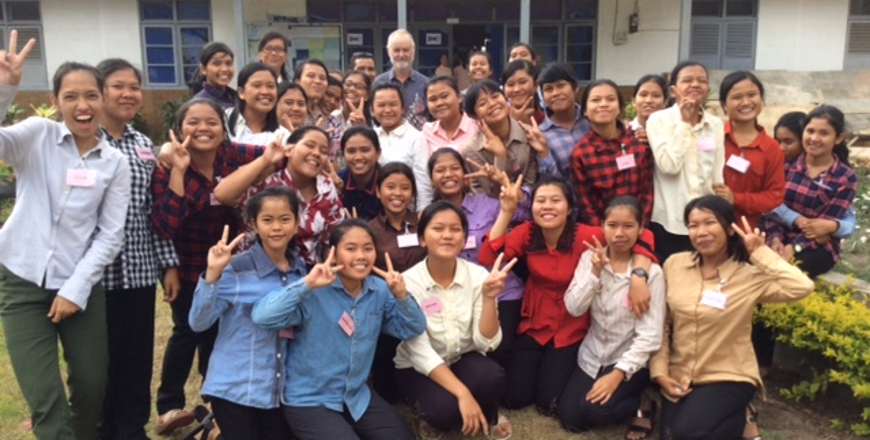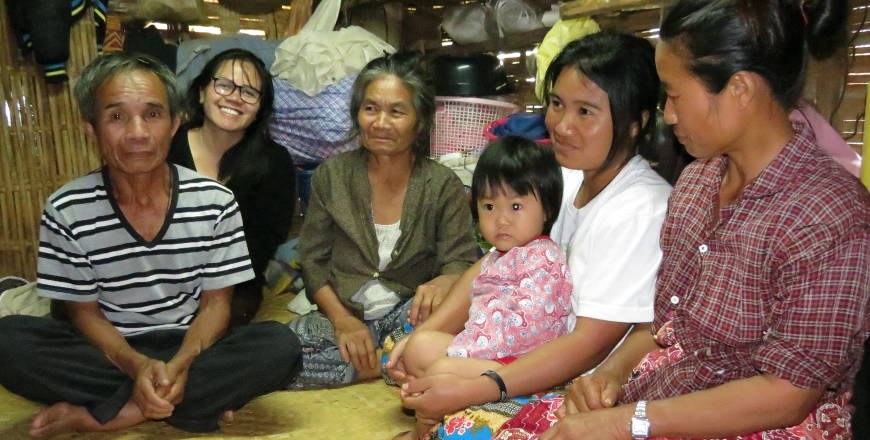The Importance of English for the Bibelvrouw College
The Bibelvrouw College, or Women’s Bible College is, as its name reveals, a Bible College for women and girls. It was founded in Batak lands, North Sumatra, Indonesia by a German missionary in 1934. She was Sister Elfriede Harder, a missionary of the Rheinische Mission Geselschaft (RMG), which is now the United Evangelical Mission (UEM) with the central office in Germany. Even though at the time, some girls went to school to train as teachers, it was not easy for girls and women to go to school. Generally, the boys and men who went to school were the children of the tribe leaders. At the time, in the Batak tribe community, women did not have the position to make decisions. This was the case even in the Batak church community under the influence of Batak culture and the theological view of the missionaries. At the time, there were no female pastors. Women could only be school teachers and work in women’ and children’s ministry in the Batak Church. But this has been changing since 1986, the Batak Protestant Christian Church (HKBP) has now opened the opportunity for woman to be ordained as a pastor or priest.
Elfriede Harder founded this Bible College for women who were divorced or widowed, and for girls. They studied the Bible, music, devotional material, and practical ministries for a year. After the course, the students were sent to the Batak churches for ministry to women, girls, children, and for youth, or as the missionaries to other islands of Indonesia.
Elfriede Harder returned to Germany because of the Second World War. Because of changes in the educational rules in the HKBP, the college was open only to girls, and the course runs for three years. In 2014, this school became a college for a Bachelor degree course of four or five years in Christian Missiology Studies Program. This study is related to the work of the students after their studies, especially in the HKBP ministries. Because the graduates will work for women, girls, children, and youth, the curriculum focuses on training for this mission. The students study theology and missiology, gender studies and feminist theology, social studies, practical music vocal and instruments, practical Christian education for women, girls, children and youth, and practical church ministries and social ministries.
We find Jesus in our Christian experiences in our lives in every context. The students of this college are Christians, and are baptized and confirmed in their local church before they enroll in the Bibelvrouw College. Those are part of the rules for all candidate students. Generally, at the beginning of their studies they know Jesus from the church’s missionary heritage, as the church taught them. But as their studies progress, they discover Jesus in the local, national, and global social contexts. They contextualized the life of Jesus in their own lives as girls in the social, political, economic contexts of Batak, Indonesia, Asia, and around the globe.
For instance, as a graduate of Bibelvrouw College, I discovered who Jesus is from the Bible texts and the contexts of his time and world. I also found Jesus’ life values in the local wisdom of the Batak culture, which is my culture. I came to understand that Jesus represents a radical democracy and radical solidarity. In Philippians 2:7 it says that Jesus emptied himself for the life of the world. He shared his life to those who lived in suffering and experienced injustice, such as the sick, the poor, prostitutes, women, children, and outcasts. He stood up for them, until nothing was left of himself, until on the cross, where everything was taken and he suffered and died for the people in his time and for the world. That was his radical solidarity.
Jesus treated all people in the same way. He called the people who lived around him as his friends. They were not in a hierarchical relationship. And he looked after the people around him. He lived in connection and inclusivity with all of kinds people. There was neither Jew nor Greek, neither slave nor free, neither male nor female, all one in Christ Jesus (Gal. 3:28). He freed everyone from the exclusion of elites and those in power over other people. That was Jesus’ radical democracy.
I also found the same wisdom in the spirit and leadership philosophy of Batak women from ancient times until today. That philosophy is still alive in the Batak tribe’s precepts, particularly in the tribe’s ritual expression applied specifically to women. The expression Parsonduk Bolon, which means someone who holds a big spoon to share food to all those around, especially in the family context and broader, is a metaphorical expression of this wisdom. Parsonduk Bolon refers to the woman in the family who shares food in love, caring, with empathy, generosity, mercy, compassion, and fairness. She loves equally everyone in the house who is eating there, without regarding the good or bad behavior of her children or anyone in the house, and regardless of the economic, social, or educational background or their age, sex, or sexual orientation. She embraces the people around her by sharing the benefits of food. She just sees the need of the people and seeks to satisfy them and give them a new spirit of life. She makes others satisfied before herself. The mealtime is the time for the family or broader community to talk to each other, even to plan their lives. Everyone can give their opinion. There is no hierarchical leadership at a round table. She shares power and authority, stands up for the “hungry, thirsty, or needy side” and does not accumulate food or any other form of power. She welcomes everyone in the warmth of hospitality. The spirit and leadership in that setting is radical in its solidarity and democracy.
That is my understanding of Jesus today. I understand the spirit and leadership of Jesus as the Parsonduk Bolon of radical solidarity and radical democracy. It has changed my Christian life. I believe that Christians, as followers of Jesus Christ, are called to live as Jesus, such as in the Parsonduk Bolon way, of sharing power, sharing authority with other people, and even with other creatures. So, how can my understanding shape my response or the church’s response to today’s social, political, and economic problems? I suggest that the spirit and leadership of Jesus such as the Parsondung Bolon way can be the spirit and leadership of Christians in the church’s theological, christological, ecclesiological, organisations, and mission in the world, particular in the Batak church’s context. So, if we all have the same opportunities we can all participate in the work for and the benefits of God’s mission in the world. I also suggest to the LCA to open the same opportunities to all members, female and male, gender and sexual orientations, of all races and nations, ages, social and economic statuses to do God’s mission in all forms, as God has opened the mission for us in Jesus such as the Parsonduk Bolon way, or utterly self-giving one. Christian theology then will have contribution to sustain human beings and all other creatures living with sustainability and distributive justice in all forms for well-being.
To study for this broader mission, Bibelvrouw College students and lecturers need more English. Limitations in the language have often made it difficult for us to access the information we need from advanced English theological or missiological texts. We also desire to share our faith, lived experiences and our knowledge with the global community, and vice versa. These kinds of studies would enable us to compare the situations we face and learn how to improve the life of our community, especially of women, girls, children, and youth who face the problems of globalization and its impacts in our areas, such as HIV/AIDS, drugs, unemployment, domestic and community violence, lack of education, lack of understanding technology, and ecological problem. Furthermore, we need English as globalisation has come to our local areas, with our Lake Toba becoming an international tourist destination. That is a big challenge for us. The churches in our lands have to respond to such challenges. So, we really need advanced English.
We have English native speakers from Australia who help our students with conversational English conversation. They have been a wonderful resource and are very helpful, as we do not have enough the opportunity to meet English native speakers. These volunteers have helped us to become at ease and confident with English native speakers. They have also helped me to prepare for my visit to Australia and my further study. I have come to Australia to improve my English skills in listening and speaking by living with the English native speakers in Victor Harbor and Adelaide South Australia. It has been very helpful. However, as a Bachelor degree college, we need English teachers from the LCA who are able to teach reading, listening, speaking, and writing English for academic purposes. So that our college can make progress in developing the competencies and capabilities of our students in their Christian Missiology studies program for their future work in ministries to women, girls, children, and youth.
If you would like to consider the opportunity to serve as a volunteer in mission, serving in practical ways, teaching English, teaching in the seminaries and institutions of our partner churches, or in local churches, you are invited to phone Nevin on (08) 8267 7300 or email nevin.nitschke@lca.org.au. For more information, go to http://www.lcamission.org.au/join-gods-mission/volunteer/
Read more stories about volunteering at www.lcamission.org.au/category/join-gods-mission/volunteers/



